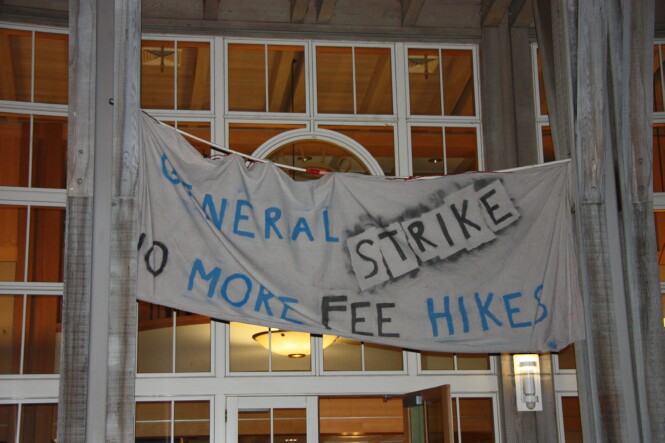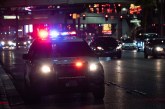
The appointment of former Supreme Court Justice Cruz Reynoso was a good move for UC President Mark Yudof. He is an individual who is well respected by many in this community and, in particular, among the group most likely to be skeptical of the idea of a task force.
Conservatives and critics, who look at his expulsion from the California Supreme Court more than a quarter century ago as the sum total of his life, are missing a long and esteemed body of work that transcends the politics of that moment in time.
He is a compassionate but thoughtful person. In fact, in many ways, he was simply a victim of circumstance. Under most conditions, his careful demeanor would have hardly raised a murmur of protest.
The reaction of most in the civil rights community, familiar with his work, is probably captured well by Natalie Wormeli’s comment to the Vanguard on Monday: “Any Californian should know from Cruz’s years on the bench, as well as his work on different non-profits, that he’s a very fair and thorough worker and he will bring his experience and his brain and his heart in a way that no one else can.”
“I’m confident that he’ll do what everybody needs at this point, which is a fair analysis and provide some excellent recommendations as to [how] we can all move forward,” she added.
In speaking with the former Justice, it was clear that he understood all too well the pitfalls here, and in fact, he was extremely reluctant to take the position. But apparently Mark Yudof said the right things in his phone conversation, for Mr. Reynoso took the appointment and believes that this is the best way to ensure that justice will occur.
However, there are very serious pitfalls involved here. While protester Eric Lee perhaps overreacted to William Bratton as the investigator, the fact that neither he nor any of the other protesters knows much about Cruz Reynoso suggests that this is an appointment unlikely to register with them.
They are wholly outcome-based, wanting, as expressed aptly by Professor Nathan Brown last night as students voted to occupy and blockade Dutton Hall for two weeks, to see three things: Chancellor Katehi resign, a restructuring or disbanding of the UC Davis Police Department, and students’ fees to be frozen.
That focus likely will cause students to react against any finding that does not contribute to that result.
That sentiment was summed up well by Eric Lee who said, “It doesn’t matter who is on the task force, because the task force itself is a joke. We don’t want a task force – we want Chancellor Katehi to resign. Anything less than that is not anything that we’re interested in being a part of.”
The Cruz Reynoso move, in that light – assuming that the President understood this dynamic and he very well might not have – is meant to quell the community’s misgivings about the event more than the students’. It is in that sense a move to splinter the discontent and leave the students out on a limb, with the community backing whatever Cruz Reynoso suggests needs to be done.
That is perhaps an unfair oversimplification, but one that cannot be overlooked.
The other key problem is that Mr. Reynoso and his task force will be merely reviewing the report by William Bratton.
As such, the review can only be as good as the investigation. That creates a problem of its own. One thing that the Vanguard is looking into is exactly how much power Mr. Bratton will actually have.
Short of subpoena power and the power to examine the university’s hard drives, it is hard to imagine that Mr. Bratton will really be able to get to the bottom of what happened.
At one level, the question is a simple matter of use of force. The university’s protocols suggest that the use of pepper spray was unwarranted, given the fact that the students presented no immediate threat to the officers or the public. In fact, that is how the case law appears to read, as well.
But the bigger question is really who authorized that use of force. The Chancellor has changed her story too many times now – at first she was supportive and defensive, then appalled, then she denied authorizing the use of force. She also had denied having direct authority over the police. The investigator will have to have access to internal memos and hard drives to see what communications were sent to the UC Davis Police and from whom.
If Bratton lacks that power, then we will simply not have the ability to know any of this, and his investigation, whatever his motives may actually be, will be compromised.
There is really nothing that Cruz Reynoso can do if he is merely reviewing the investigator’s report, and if that investigator is not getting to the truth.
So, in a lot of ways, the Cruz Reynoso appointment could end up being the cherry on top of a mud pie from Mark Yudof and Linda Katehi – the fancy topping that hides the truth of a sham investigation.
We are admittedly speculating on this point, only to emphasize how important it is that the investigator have true powers of subpoena behind him, and how little we know about what those powers are.
In the end, we trust Cruz Reynoso to do the right thing, but whether he has the power to do it or not may be out of his hands.
—David M. Greenwald reporting






The most recognized symbols in the world?
[img/Users/henrycwyman/Desktop/MostRecognized.jpg][/img]
Sorry, unable to add jpg file for some reason. Ignore comment.
“That focus likely will cause students to react against any finding that does not contribute to that result.”
They get their way or else! Why even bother getting to the facts?
As someone who has been waist deep in the day-to-day at UCD since the incident, I can say that students by and large don’t care nearly as much about the Dutton Hall occupation or the call to restructure the police as they do about the fees. I have listened to hundreds of undergrads on the issue of call for Katehi to resign. Concern on this issue drops exponentially with distance from the tents (I will do Dutton Hall today—stay tuned). My huge class was well populated yesterday morning. These kids have paid their fees and are doing what they came to UCD to do. They really hate the notion of greatly increased fees.
From Wikipedia:
[quote]Impact of the ouster campaign
The 1986 California Supreme Court retention election started a major trend turning such elections into “an ideological battleground over judicial philosophies and specific decisions”, making them “as highly salient as races for overtly political offices”, wrote one academic paper.[33] Even before the election, California Supreme Court Justice Otto Kaus remarked “You cannot forget the fact that you have a crocodile in your bathtub”, referring to the act of making a judicial decision without regard to the potential political consequences. “You know it’s there, and you try not to think about it, but it’s hard to think about much else while you’re shaving.” “You keep wondering whether you’re letting yourself be influenced, and you do not know. You do not know yourself that well,” he wrote. “You worry about it in two different ways,” wrote Reynoso; “First you worry it might influence you improperly. Then you worry because you’re concerned you might overcompensate, and not pay enough attention to arguments that are perfectly legitimate.”
Erwin Chemerinsky, a law professor from the University of Southern California, agreed with the ousted Justice Grodin, saying “the legacy of 1986 could be that justices facing retention elections will decide cases with an eye, perhaps subconsciously, on how their rulings will affect their chances at the polls.”[40] Chemerinsky called for abolishing judicial-review elections.[40] He wrote, “Largely due to defects in a poorly worded death penalty law, the court had a strikingly one-sided pattern of decisions on the issue”, noting that this, Bird’s controversial history, the trio’s appointments by an unpopular governor, and the realization by their opponents that the court’s ideology could be completely changed if the campaign succeeded lead to the opposition campaign. Jazon Czarnezki, assistant professor of law at Marquette University, attributed Bird’s defeat to “her resolute opposition to the death penalty and overturning a series of death sentences”. Exit polls indicated that the death-penalty issue was the major reason why voters refused to retain the justices
The justices were also impacted by a lack of support from Democratic legislative incumbents in safe districts.
Despite the fact that California Supreme Court justices undergoing a retention election are running uncontested, the median spending for justices’ campaigns rose from $3,177 in 1976 to $70,000 in 1994.
Campaigns similar to the one expelling Bird, Grodin, and Reynoso have since been mounted against judges in other states, such as Justice Penny J. White of Tennessee, who also lost a retention election due to a death-penalty issue.[44] Retired California Supreme Court Chief Justice Ronald George advocated eliminating retention elections and appointing justices to single 15-year terms, following an election in Iowa where three justices were removed from office after that state’s high court overturned a ban on same-sex marriage. The campaign was largely funded by out-of-state organizations; George said that the January 2010 United States Supreme Court ruling allowing corporations and unions to contribute unlimited sums to independent political committees was likely to increase the influence of well-funded groups in nonpartisan judicial retention elections like those in Iowa and California.[/quote]
From Wikipedia:
[quote]Post-judiciary
After leaving the Court, Reynoso returned to private law practice and academia. Shortly after his ouster, he was appointed to the California Post Secondary Education Commission.
He has worked for the New York–based firm of Kay, Scholer, Fierman, Hays & Handler, out of their Sacramento office, where he was a special counsel. He worked on complex civil litigation, as an expert witness on legal ethics, and as a mediator. His agreement with the firm allowed him to spend up to 40 percent of his time on pro bono work.
In 1991, he joined the faculty of the UCLA School of Law, where he taught until 2001. He was a faculty adviser for the Chicano-Latino Law Review In 1995, UCLA law students selected him as Professor of the Year.
The United States Senate appointed Reynoso to the U.S. Commission on Civil Rights in April 1993. He was appointed the vice-chairman of the Commission by President Bill Clinton on November 19, 1993. During his tenure, he accused California Governor Pete Wilson of generating anti-immigrant sentiments to gain popularity. When the Commission harshly criticized Florida’s handling of the presidential election of 2000, Reynoso said “the greatest sin” was the number of people who weren’t allowed to vote. He was among the commissioners that looked into complaints that some eligible voters were denied the right to vote, or that votes were improperly counted, in Florida. Reynoso, along with Commission chairwoman Mary Frances Berry, resigned his commission on December 7, 2004, after President George W. Bush’s White House staff announced that their six-year terms had expired on December 5 and announced replacements for them. Berry and Renoso maintained that their commissions were not due to expire until midnight on January 21, 2005, but said in their resignation letters that it wasn’t worth the fight. The move to replace them occurred after the Commission released a draft of a report criticizing Bush’s civil rights record.
On July 1, 2001, Reynoso joined the faculty at the University of California, Davis, School of Law as the first Boochever & Bird Chair for the Study and Teaching of Freedom and Equality. The chair, established with a gift from UC Davis alumni Charles Bird, is named in honor of Judge Robert Boochever and Bird’s parents, and is awarded in recognition of outstanding scholarship, teaching, and commitment to preserving and expanding the understanding of “the virtues necessary of a great republic.” He retired in December 2006, becoming a professor emeritus.
In 2009, Reynoso spoke with UC Davis law students, noting that he has retired a few times, but was then chairing a citizens’ commission investigating the death of Luis Gutierrez, a farm worker shot by police in Yolo County.
President-elect Barack Obama appointed Reynoso to his White House transition team in early 2009, as part of a justice and civil rights sub-team.
Following a June 10, 2010 Washington, DC screening of Cruz Reynoso: Sowing the Seeds of Justice, the Abby Ginzberg documentary film, he was injured in a car accident in Virginia, along with his wife Elaine and grandson. Reynoso suffered a broken collarbone, a punctured lung, and other injuries when a Hummer struck their rental car at an intersection, hospitalizing him for nine days. His wife suffered “grave injuries” to her brain and internal organs, requiring multiple surgeries. Both were placed into medically-induced comas; Elaine remained in a coma after the inducement was stopped. Reynoso was initially cited for pulling out into the path of the Hummer, which had the right of way, but a judge dismissed the case. Elaine Reynoso resigned from her position as a trustee of Sierra College in June 2011 to focus on recovering from her injuries; she has required extensive physical rehabilitation.
After the accident, Reynoso said he has re-evaluated his priorities, and will focus on completing his memoirs and legal articles, as well as resuming work on the Yolo citizens’ commission probe. The commission’s work was put on hold while the Reynosos recuperated.
Reynoso has served on the boards of directors of the Mexican American Legal Defense and Education Fund, the Natural Resources Defense Council, and Children Now. He co-founded the Latino Issues Forum with Bob Genasda, and was Chairman of its board of directors. He is a trustee of the Garment Workers Trust Fund.[/quote]
Elaine: feel free to post the link, but you can’t cut and paste long segments of Wikipedia. Feel free to highlight key points with quotes.
What I posted were small sections of an entirely larger article. However, below is the link to a history of Cruz Reynoso…
[url]http://en.wikipedia.org/wiki/Cruz_Reynoso[/url]
[quote]In the end, we trust Cruz Reynoso to do the right thing, but whether he has the power to do it or not may be out of his hands.[/quote]
By the way, I suspect this is a very astute observation…
“They get their way or else! Why even bother getting to the facts?”
A strategy learned from congress?
since the vanguard has all but called for Katehi’s resignation, it is clear the vanguard doesn’t really want an investigation either. it simply wants Cruz to rubberstamp calls for her resignation.
91 Octane, that’s a definite dilemma when the [u]Vanguard[/u] is torn between being am apparent desire to be a reporting/journalism operation and an one-sided/activist operation. From a reader viewpoint, however, it’s apparent what’s winning out. That doesn’t make it wrong. It is what it is.
[u]Second try. I don’t know what’s wrong with my computer….[/u]
91 Octane, that’s a definite dilemma. The [u]Vanguard[/u] is torn by its apparent desire to be a reporting/journalism operation as well as to be one-sided/activist operation. From a reader viewpoint, however, it’s apparent what’s winning out. That doesn’t make it wrong. It is what it is.
Unless the Task Force and the investigator have subpoena power and can take witness testimony under penalty of perjury, I doubt that much will get done. I think I will send more money to the ACLU to assist them with costs of taking the depositions that are going to get to the truth.
Also, remember, the spraying was a clear criminal battery. It wont get charged (not by this DA, anyway), but it will give Lt. Pike the option of taking the 5th if he is served with a subpoena.
Anyone seen UCD graduate Rob Roy’s brilliant Youtube piece on the spraying?
Based on MH’s “clear criminal battery” comment, I’m compelled to re-post my comment to an earlier related thread:
First, I tend to agree that using pepper-spray on passive, non-violent protesters is wrong. However, does the same hold true for using pepper-spray on people committing criminal acts that are not free speech expressions?
So, some food for thought, sharing items and information I came across over the last week or so that perhaps casts a different light on things than the perspective that came from the initial images and reports of a week ago:
1 – I saw a video-taped, TV style interview of a student who was invoved in what happened between the UC Police and the students on 11/18. This person said that, as members of the crowd that surrounded and closed in on the police, they demanded the police release their prisoners if they wanted to leave. (I believe the link to this interview was on an earlier Vanguard comment.)
2 – A second written description of what took place, found on DavisWiki, discusses what preceded and perhaps precipitated the police response. It tends to corroberate the TV interview mentioned above and discusses the fact that some of the crowd were chanting menacingly, “#@%! the cops.” (There may be more similar journal entries, but I didn’t have enough time to read the volumes.)
3 – Subsequently released videos and photographs show a different scene than the infamous images depict. They depict the police officers completely encircled by both a seated and standing crowd. They also depict the officers standing huddled together in a Custer-like cluster, with their backs to each other and protecting/securing their prisoners–a posture that looks like they were fearing attack from any quarter and were closing ranks, protecting the flanks. What I’m saying is the police officers’ posture depicts what appears to be genuine fear, or at least substantial anxiety. This seems to potentially be photographic proof of a state of mind.
4 – I looked at the California Penal Code (I won’t quote the verbiage, because the sections are easily found, as evidened by my finding them without difficulty) and found a number of potential criminal acts or attempts of those acts: False Imprisonment, Riot (don’t gasp, it reads differently than most think), Lynching (again, don’t gasp, it reads differently than what most people envision when they hear the word), Conspiracy, and maybe even Extortion.
5 – Protected, free speech activities usually don’t include serious, potentially violent, or threat-leaning felonies and misdemeanors. Those go way beyond civil disobedience.
Therefore, the question becomes, were the pepper-spraying officers really dealing with peaceful protesters? Or were they actually dealing with threatening felony criminals (or at least threatening misdemeanor criminals) attempting, in concert, through the use of fear-inspiring actions and language, camoflaged by postures made to appear non-threatening, to cause innocent people (officers lawfully doing their jobs, up to that point) to cower and submit? I only ask this because, while admittedly the use of pepper-spray on peaceful protesters, as depicted virally just about everywhere, is just such an ugly act, is it society’s desire that police officers not be permitted to use pepper-spray on criminals who attempt to use criminal threats or compulsion to force their will. The decisions we or the courts make will extend beyond the specific circumstances of the actions viewed on 11/18 on the UCD campus.
Again, food for thought, and a reminder that there may be other perspectives not yet revelaled or considered.
Andrew T, good post. From where I sit some have jumped to consclusions before knowing all the facts.
It appears that some here don’t seem to realize is: this matter is contextual and fact bound.